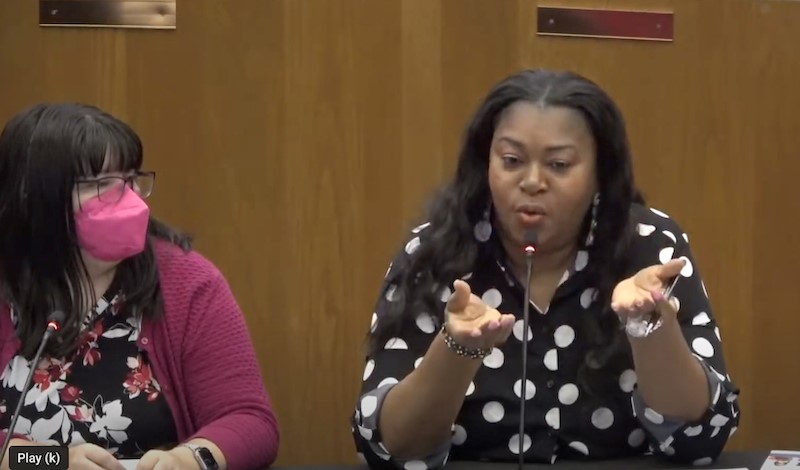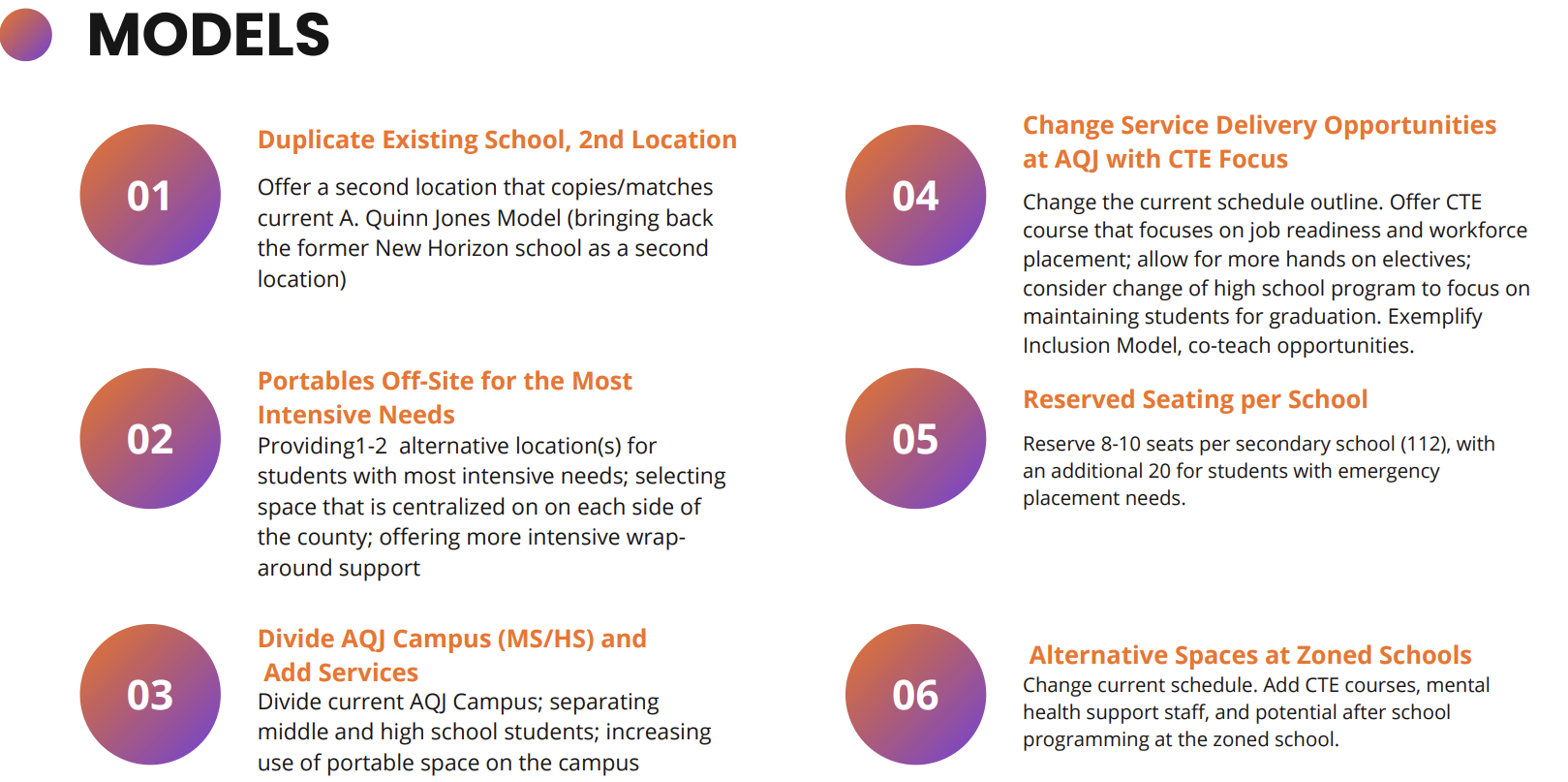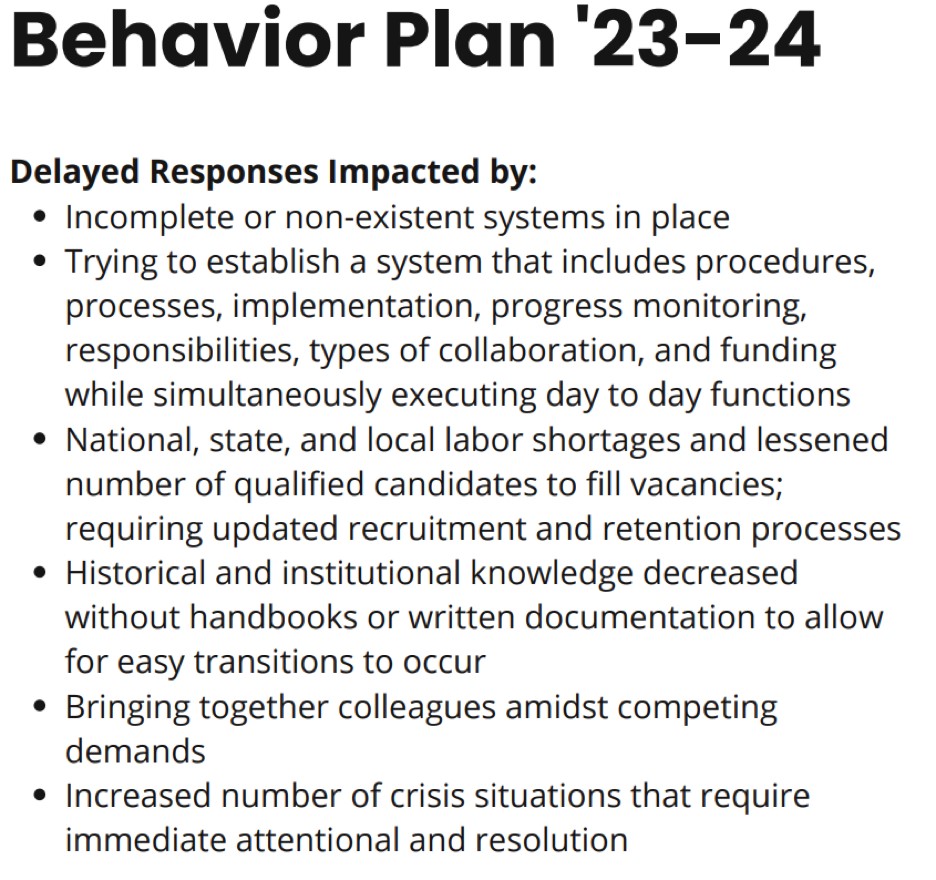BY AMBER THIBODAUX/Alachua Chronicle
GAINESVILLE, Fla. – The Alachua County School Board held a workshop on May 3 where they discussed the ongoing behavioral issues and discipline problems facing the district and how best to deal with them. Chief of Equity, Inclusion, and Community Engagement Anntwanique Edwards gave a presentation that outlined six different models (shown below) that the school board could implement to provide further assistance to teachers and students. All six models focused on removing or relocating students with behavioral issues and giving them extra support in more structured settings. Edwards told the board that the referral rate has “skyrocketed,” not just in secondary schools but also in elementary schools, and that the types of behaviors leading to the referrals are of major concern.
Slide from Dr. Edwards’ presentation at May 3 workshop
“We know that increased trauma has occurred with many of our students, especially since COVID, and we would like to minimize the number of various behavioral types that are sitting on one campus,” Edwards said. She noted the various “neighborhood associated issues” (i.e., rival gangs) that carry over to school campuses but said she couldn’t say with certainty that those conflicts would be resolved by creating a second alternative school. She also mentioned the increase in student weapons charges and gang affiliations and worried about separating those students out while at the same time serving their individual needs off-site.
Career and Technical Education focus
After listening to the pros and cons of each model and associated costs, the board unanimously agreed to proceed with Model 4, which would change the service delivery at A. Quinn Jones (currently the only alternative placement school in the district) to a Career and Technical Education (CTE) focus. Edwards told the board that she had spent extensive time looking at alternative schools across the nation to see which models work best.
“What appears to be most consistent with alternative school placements is really about how we’re delivering services to students – being able to provide those wrap-around services, helping kids to be able to make connections between where they are now and their future, how they’re going to be prepared for it, the employability skills,” Edwards said.
She explained that those students who were most successful were graduating from their alternative school placements instead of going back to their zoned schools, then asked the board to consider investing more money into a setting where a CTE program and mental health services are offered all in one place.
“There are kids who typically do well in smaller settings, and I think it is probably the fallacy a lot of times in education and other support areas where we take students and we put them into settings, and they do well, and they’re successful, and then we put them back into places where they were unsuccessful – when in reality, the culture and the environment of the small setting was what allowed them to have that success.”
Currently the student-teacher ratio at A. Quinn Jones is very low, with some classes having between 0-3 students per teacher (zero in cases where no students show up to class). The school has 181 spots available but only 107 students are enrolled; 21 of those students have committed felony offenses, and 31 are transfers from other alternative programs or school districts. The school is designed with an exit plan for students to return back to their zoned schools if possible. However, under the proposed Model 4, students at A. Quinn Jones would be provided with alternate education opportunities that are predicted to be of high interest, would receive instruction based on their individual learning styles and needs, and would be given help in behavior support and career readiness preparation. These students would ultimately graduate from A. Quinn Jones.
Edwards also suggested partnering with UF to deploy Board Certified Behavior Analyst (BCBA) interns at various schools, since the county only has one BCBA currently employed to serve the entire district.
Edwards said she had spoken with some people at UF and found that they provide other districts with BCBA interns, but not Alachua County. She concluded, “I think they are definitely amenable and open and so we have some upcoming conversations about how can we partner with [UF] in order to be able to get some of that insight from the people who specialize in working with behavior.”
Several factors have delayed staff’s response to board requests for better discipline
Edwards completed her presentation by acknowledging the “delayed responses” in addressing the behavior issues and said the delay had been caused by a lack of existing systems, the difficulty of creating a new system while dealing with day-to-day responsibilities, labor shortages, a lack of written documentation, and an increased number of crisis situations that require an immediate response.
Slide from Dr. Edwards’ presentation at the May 3 workshop
McGraw and Abbitt emphasize the need for communication and consistency
Board Member Diyonne McGraw said that she continues to be in favor of an additional alternative school because most of the staff members she’s spoken with say that the Positive Behavioral Interventions and Supports (PBIS) model that the district currently follows is not working. “When a kid brings a gun to school and when someone is continuing to attack, they need to be pulled out, they need to be worked with,” McGraw said.
McGraw also addressed the importance of parental involvement and a Parent Academy, saying that she continuously receives phone calls from parents who need help: “Once we build relationships and you’re talking to parents, that’s extremely important.”
“It’s not about snatching a kid out and separating them, but sometimes, given where we are past COVID, because there’s a lack of discipline – consistent discipline – in the homes, it is affecting us here at the school system. So when you talk about this, this is a lot of work. That’s why you need all the players,” McGraw said.
Member Kay Abbitt stressed the importance of having equal and consistent consequences for negative behaviors so parents and teachers understand what the consequences are for specific infractions. “If I vape in a bathroom, this is my consequence. It doesn’t matter if you’re an A student in school, or an F student in school, or purple or pink – this is what’s going to happen.”
“If you don’t know what the consequence is and if it’s not enforced consistently at schools – and I know for a fact that it’s not because I’ve spoken to teachers and deans and it’s not enforced… to me these things are very simple. You have a rule that someone has to follow, and you have a consequence, and you enforce it,” Abbitt said.
She also emphasized that the district needs to have a behavioral plan in place and “market it like crazy” with a no-nonsense approach, as well as a “Professional Development” plan that goes out to parents who may need help with learning coping skills or parenting techniques.
Chair Tina Certain wrapped up the discussion by taking an informal vote to proceed with Model 4 at an estimated cost of $64,000+, the least expensive of all the models proposed. She reminded the board that “something is going to have to be cut” to secure the funding.
The workshop can be watched in its entirety here.
# # #
Email editor@
alachuatoday.com
School Board Adds Career and Technical Education Focus at A. Quinn Jones to Address Discipline Issues

School Board Member Diyonne McGraw weighs in on alternative school models at the May 3 workshop | From Alachua County Public Schools broadcast video
Tools
Typography
- Font Size
- Default
- Reading Mode



